The views expressed in our content reflect individual perspectives and do not represent the authoritative views of the Baha'i Faith.
I find England awake; there is spiritual life here. But your poor are so very poor! This should not be. On the one hand you have wealth, and great luxury; on the other hand men and women are living in the extremities of hunger and want. This great contrast of life is one of the blots on the civilization of this enlightened age.
You must turn attention more earnestly to the betterment of the conditions of the poor. Do not be satisfied until each one with whom you are concerned is to you as a member of your family. Regard each one either as a father, or as a brother, or as a sister, or as a mother, or as a child. If you can attain to this, your difficulties will vanish, you will know what to do. This is the teaching of Baha’u’llah. – Abdu’l-Baha, Abdu’l-Baha in London, p. 91.
This particular quote records Abdu’l-Baha’s frank response to a presumably polite inquiry from a Catholic rector in a British Parish, who apparently asked the foreigner an innocuous question like “How do you find England?” Abdu’l-Baha, characteristically honest, straightforward and spiritually enlightening, gave him this now-famous answer.
In the early 1900s, not yet that far past the horrendous Dickensian era, Great Britain still suffered from terrible, endemic poverty. Historians estimate that a quarter of the British population still lived in dire need at the turn of the 20th Century, when Abdu’l-Baha first visited. During and after that period, progressive reformers, organized labor unions and the British government itself gradually found ways to raise people out of poverty, first by instituting free school meals for poor children; then by setting minimum wages; building labor exchanges and job councils; granting workers paid sick leave, establishing unemployment benefits and finally implementing taxation policies that asked the wealthy to pay a greater share of their income and assets. Today, some poverty still exists in England, but at much, much smaller percentages than a century ago. Today, Abdu’l-Baha might recognize England as a place that had taken his advice to heart and turned it into social and economic readjustment—but also as a place which still has much work to do among its immigrants and citizens who remain poor.
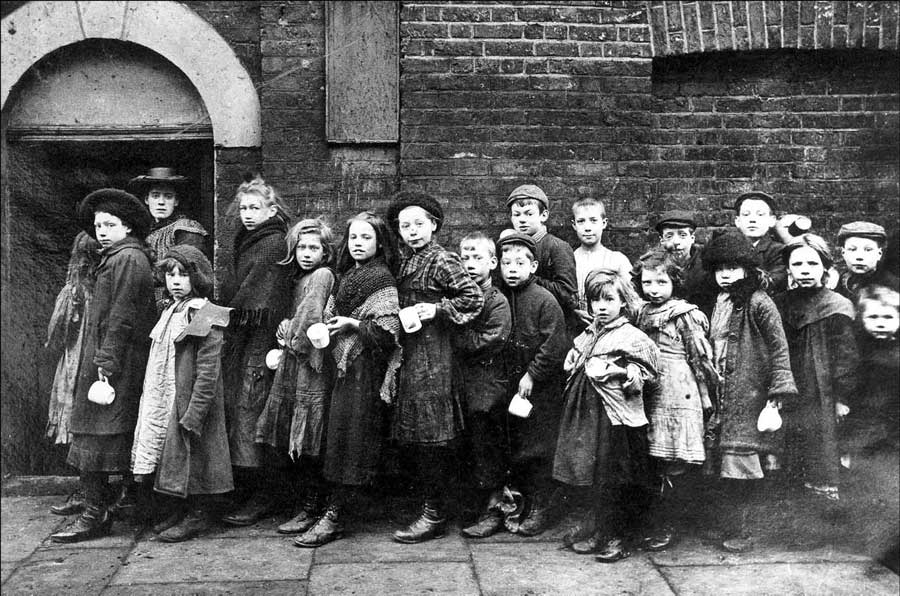
Children in line for breakfast in London circa 1900.
So what do the Baha’i teachings recommend to accomplish this “betterment of the conditions of the poor?” Should government forcibly take the “wealth and great luxury” Abdu’l-Baha mentions from the rich and give it, Robin Hood-like, to the poor? If not, how does the Baha’i Faith propose to rectify “this great contrast of life, one of the blots on the civilization of this enlightened age?”
As far as I can determine, the best way to describe the Baha’i solution to income inequality, the enormous gap between the extremes of wealth and poverty in our society, involves a unique, spiritualized combination of policy and philanthropy working together in tandem:
A financier with colossal wealth should not exist whilst near him is a poor man in dire necessity. When we see poverty allowed to reach a condition of starvation it is a sure sign that somewhere we shall find tyranny. Men must bestir themselves in this matter, and no longer delay in altering conditions which bring the misery of grinding poverty to a very large number of the people. The rich must give of their abundance, they must soften their hearts and cultivate a compassionate intelligence, taking thought for those sad ones who are suffering from lack of the very necessities of life.
There must be special laws made, dealing with these extremes of riches and of want. The members of the Government should consider the laws of God when they are framing plans for the ruling of the people. The general rights of mankind must be guarded and preserved.
The government of the countries should conform to the Divine Law which gives equal justice to all. This is the only way in which the deplorable superfluity of great wealth and miserable, demoralizing, degrading poverty can be abolished. Not until this is done will the Law of God be obeyed. – Abdu’l-Baha, Paris Talks, p. 154.
“Special laws made,” Abdu’l-Baha says; and then he says “the rich must give of their abundance.” Here the Baha’i teachings put forth a unique and unprecedented dual prescription for alleviating poverty—enlightened, voluntary benevolence from the wealthy, along with spiritualized governmental policies based on equal justice—policy plus philanthropy. Let’s look a little deeper:
Man reacheth perfection through good deeds, voluntarily performed, not through good deeds the doing of which was forced upon him. And sharing is a personally chosen righteous act: that is, the rich should extend assistance to the poor, they should expend their substance for the poor, but of their own free will, and not because the poor have gained this end by force. For the harvest of force is turmoil and the ruin of the social order. On the other hand voluntary sharing, the freely-chosen expending of one’s substance, leadeth to society’s comfort and peace. It lighteth up the world; it bestoweth honour upon humankind. – Abdu’l-Baha, Selections from the Writings of Abdu’l-Baha, p. 115.
Baha’is believe that this sort of spiritual advancement and voluntary help for others based on free will constitutes the ultimate state of society—but until we get there, we will need legislated remedies, too:
The fourth principle or teaching of Baha’u’llah is the readjustment and equalization of the economic standards of mankind. This deals with the question of human livelihood. It is evident that under present systems and conditions of government the poor are subject to the greatest need and distress while others more fortunate live in luxury and plenty far beyond their actual necessities. This inequality of portion and privilege is one of the deep and vital problems of human society. That there is need of an equalization and apportionment by which all may possess the comforts and privileges of life is evident. The remedy must be legislative readjustment of conditions. The rich too must be merciful to the poor, contributing from willing hearts to their needs without being forced or compelled to do so. The composure of the world will be assured by the establishment of this principle in the religious life of mankind. – Abdu’l-Baha, The Promulgation of Universal Peace, p. 107.
Does all of this mean that Baha’is advocate a classless society, with absolute economic equality and the redistribution of income and assets? No—absolutely not, in fact. The Baha’i teachings envision a future state of human society very different than the current, prevailing capitalist, socialist or communist economic theories and models. In the next essay in this series, let’s explore that important issue.
Next: Can We Create a Classless Society? Should We?


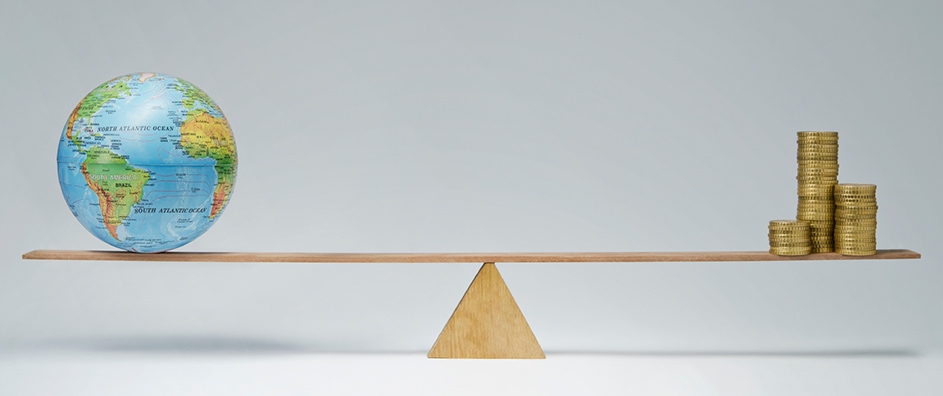


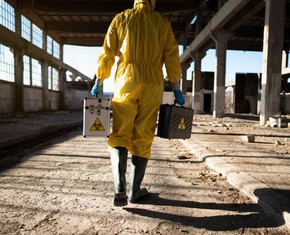
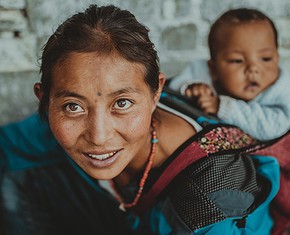



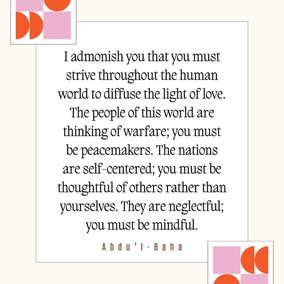
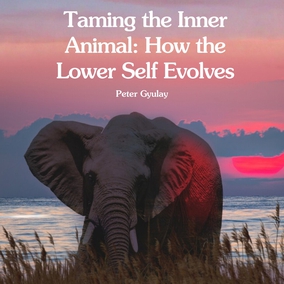
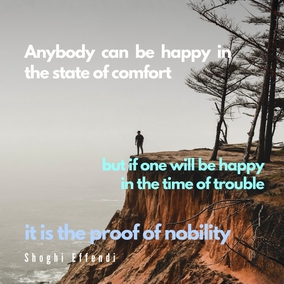
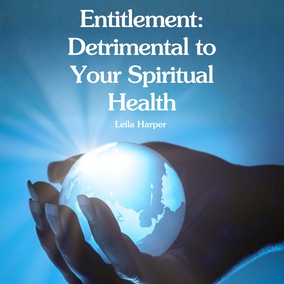
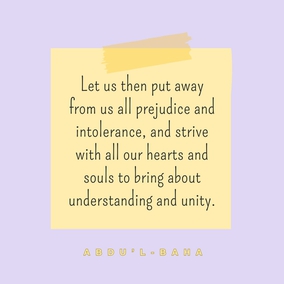

Comments
Sign in or create an account
Continue with Googleor